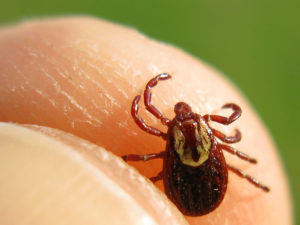
Ticks are found in every part of the continental United States, and although they seem small and harmless, they often carry serious diseases that can infect human hosts when bitten. Seniors are part of a vulnerable host population that includes children and those with compromised immune systems. This means that if they are infected with a tick-borne illness, they face greater risks to their health and have a more difficult time recovering. There are several things that family caregivers and their elderly loved ones need to know about ticks so they can avoid these diseases.
Why Ticks are Dangerous
Ticks primarily live in the Northeast, Great Lakes region, and Midwest, but they can be found everywhere from coast to coast. They live in tall grasses and low shrubs, preferring shady areas and forests. The ticks carry microscopic bacteria that are transferred to humans with a bite. As the germs spread throughout the bloodstream, they aggressively attack the body and are very difficult to eliminate. Because seniors don’t have a robust immune system, they are more likely to suffer severe symptoms and experience life-threatening illness as a result.
Tick-Borne Illnesses
There are different kinds of ticks, and they carry a range of diseases that can cause health problems in seniors and others. Lyme disease is perhaps the best known, and the illness can last several months before recovery. Symptoms include rash, irregular heartbeat, arthritis and joint pain, nerve pain, partial facial paralysis and short-term memory loss. Babesoisis is an illness similar to malaria and is particularly hazardous to seniors. Symptoms include fatigue, fever, mental confusion, anemia and dehydration. There are just a few of the tick-borne diseases that seniors can get from a tick bite.
Preventing Tick Bites in Seniors
The best way to avoid tick bites is to be prepared when going outside into areas with lots of vegetation. Seniors should wear long pants and long sleeves and stay away from overgrowth and underbrush. Insect repellant is also an effective tick-deterrent. After an outdoor excursion, the elderly should inspect themselves or as a family member or senior care aide to check their clothes, hair and body for ticks. Seniors should also inspect their pets for ticks, as that is a common way for ticks to get indoors. Even mice and other small animals can transport ticks, so family caregivers, senior care assistants and others who attend to aging loved ones should always be on the lookout for these disease-carrying pests.
Many people don’t think that seniors are at a high risk to get a tick bite, but more elderly people than ever are affected by tick-borne problems. If an elderly person lives in a high tick area, has an outdoor/indoor pet and likes to spend time outside, they are at a higher risk of getting a tick bite and then getting the disease it carries. Staying bite free is the best way for the elderly to avoid the life-threatening illnesses that a tick bite can inflict.
Source:
https://www.cdc.gov/ticks/geographic_distribution.html
For senior care in Southern NJ and the surrounding areas, call and talk to us at Home to Stay Healthcare Solutions (856) 321-1500.












